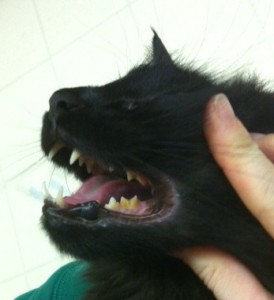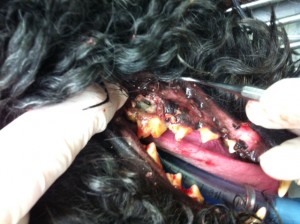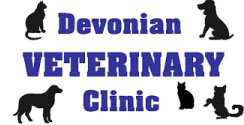The Devonian Veterinary Clinic would like to highlight your pet’s mouth this month! “Dental Month” is going to be our focus for February 2013.
 Cats and dogs, just like people, can suffer from many illnesses related to the mouth. Did you know that more than just bad breath can be a symptom? Dogs will sometimes exhibit swellings on the side of their mouth which on occasion will break open and drain infected debri. This can be caused by an infected tooth root.
Cats and dogs, just like people, can suffer from many illnesses related to the mouth. Did you know that more than just bad breath can be a symptom? Dogs will sometimes exhibit swellings on the side of their mouth which on occasion will break open and drain infected debri. This can be caused by an infected tooth root.
Cats will sometimes lose weight and seem otherwise to be perfectly healthy. Unable to tell us that their teeth hurt, our pets get by as best they can and suffer in silence. Rarely do dogs and cats stop eating completely with bad teeth. By the time you can actually smell their bad breath we have missed a couple of earlier stages where we can prevent the pain.
Having the teeth cleaned before they are rotten is not just good for your cat or dog but earlier intervention reduces the cost of the procedure. A dental prophylaxis with no extractions and no complications due to rotten gums and roots is sometimes 30-50% less expensive than a procedure full of extractions and gum reconstruction. As an added bonus, the dentals are much shorter in terms of anesthetics and drugs used for your pet – this is better for your animal. This provides a shorter surgery and less concerns for follow up procedures. Of course this does not mean if your pet’s teeth have a high level of dental disease that you should give up now. Even the most tarter laden mouth will benefit from a cleaning. With proper care and follow up we can prevent your pet from needing further extensive dental procedures in most cases.
There are also certain breeds of dogs that put them into a high risk category. Poodles, Shih Tzus, Chihuahuas, and Pugs can provide some great examples of what happens when there are too many teeth in the mouth and not enough room to space the teeth out. Retained baby teeth also add more cramped spaces for tarter and plaque to build up quickly. Some of these breeds are even in need of a cleaning at 4-5 years old.
Dental diet foods can also help to reduce the need for more costly procedures. Starting your dog and cat on a dental diet can help you to decrease the need for a dental procedure. For the ones who need it, the dental diet and brushing after meals (for the pets who will let you!) can prevent a follow up cleaning from being needed too soon afterwards. Please call in and book to see one of the Animal Health Technologists who can help to put a dental plan (including estimates for procedures that are recommended and home treatment plans) for any of your pets today!

